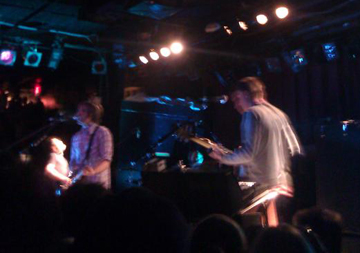Death Cab for Cutie at the Paradise

Death Cab For Cutie
Paradise Rock Club
Boston, MA
June 5
Outside the doors of Boston’s venerable, fairly-cozy rock club, a line extended in either direction from the middle of the Commonwealth Avenue block to its ends, to file people in to see perhaps the foremost currently playing indie-rockers: Death Cab For Cutie. The lines went nearly to each end of the block and were still fairly long at around 8:15 PM, while the opener The Lonely Forest was in the middle of their set. Passerby reaction to the longer-than-usual lines for this venue ranged from the amazed ( “Death Cab’s playing? Wow!” ) to the uninitiated ( “What’s the line for? Death Cab for who?” ). In any case, the night promised to be singular – a band that could easily play a hall twice the Paradise’s size was packing people in for a will-call only show to, for one, avoid scalpers.
Lead singer/guitarist/keyboardist/principal songwriter of the Washington state-based group, Ben Gibbard, touched on the unique nature of the evening in the middle of the show. “People asked me: ‘Why play at this place?’ We wanted to play for the hardcore fans. You’re the hard-core!” Then cheekily added, “I , myself, never had a hard-core phase,” before launching into “Grapevine Fires,” off of their second-to-latest album, Narrow Stairs, which had a quiet, reflective section in the middle ahead of people singing along to the final lyrics.
The four-piece cranked out crowd-pleasing tune after crowd-pleasing indie-rock nugget from their extensive catalogue (seven full-length albums, numerous E.P.s), showing once again that they can make their sensitive, well-written yet searing, sonically intense songs rock live. And that they’re truly one of the most accessible standard bearers of indie rock, having emerged in the early 2000s as part of that scene, and continue to define it. They’re even a sort of super-group with, besides Gibbard (he of electronic side project The Postal Service), Chris Walla on guitar, keys, programming, and backing vocals, who has worked as a producer or engineer for many modern indie musicians, such as Tegan and Sara, The Decemberists, Nada Surf, and Hot Hot Heat.
Highlights of the night included Plans’ “Crooked Teeth,” on which Gibbard alternately delivered jittery, staccato vocals and strutted around stage playing guitar and bassist Nick Harmer executed a tasty solo after the first verse. Narrow Stairs’ “Long Division” ‘s syncopated drumming and dynamic, driving music typified the night’s energy, evident also on 2005’s mainstream breakout hit “Soul Meets Body” (off Plans ), featuring Walla on keys and Gibbard on acoustic guitar, spitting out lyrics from between strands of his jaw-line-length hair; on the buoyant “Sound of Settling” ; and on “The New Year,” which started off with rock fireworks and a piercing, high-noted guitar riff. There was also a healthy dose of songs – six, to be exact – from their new album Codes and Keys, including the affecting “Doors Unlocked and Open,” with Walla on the programming station and the simultaneously sweeping and visceral title track.
One particularly effective sequence was begun with the highly radio-spun “I Will Possess Your Heart,” with Gibbard going from guitar to keyboard on the long intro-ed song that felt like it contained electronic loops, though it was just the band mesmerizing and purposefully repeating a minor key piano riff, before separated vocals of declamatory, relentless lyrics. Then Gibbard picked up an acoustic guitar and, alone, began “I Will Follow You into the Dark,” which saw people singing along all the way through, except for when, at the end of the last verse, he sings a falsetto-range vocalization on the word “rooms” while strumming. There, Gibbard drew out the high note and the crowd cheered lovingly, for a moment on a song that, in this writer’s opinion, was one of the best of 2005, and perhaps of the decade.
A shade under two hours, DCFC’s set was 25 songs strong, and spanned all seven of their discs, and ended with Gibbard stating, after the four-song encore, “You were so f-cking great! Sometimes you say it, but you don’t really mean; but here, I do,” with a broad smile. The feeling was clearly mutual.



















